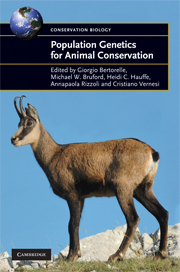Book contents
- Frontmatter
- Epigraph
- Contents
- List of contributors
- Foreword
- Acknowledgements
- 1 Introduction
- Statistical approaches, data analysis and inference
- Molecular approaches and applications
- From genetic data to practical management: issues and case studies
- Future directions in conservation genetics
- 14 Recent developments in molecular tools for conservation
- 15 Theoretical outlook
- Software index
- Species index (common name)
- Species index (Latin name)
- Subject index
14 - Recent developments in molecular tools for conservation
from Future directions in conservation genetics
Published online by Cambridge University Press: 05 July 2015
- Frontmatter
- Epigraph
- Contents
- List of contributors
- Foreword
- Acknowledgements
- 1 Introduction
- Statistical approaches, data analysis and inference
- Molecular approaches and applications
- From genetic data to practical management: issues and case studies
- Future directions in conservation genetics
- 14 Recent developments in molecular tools for conservation
- 15 Theoretical outlook
- Software index
- Species index (common name)
- Species index (Latin name)
- Subject index
Summary
INTRODUCTION
The availability and application of molecular tools for biodiversity conservation has advanced considerably over the last 15 years, as has been documented in a series of books (e.g. Loeschcke et al. 1994; Avise and Hamrick 1996; Smith and Wayne 1996; Frankham et al. 2002, 2004), the journal Conservation Genetics (in production since 2000) and a series of reviews, all of which give the impression of a maturing discipline (e.g. Hedrick 2001; DeSalle and Amato 2004). Dramatic advances in data analysis have occurred over the last five to seven years and these are welldocumented elsewhere in this volume. However, in other respects, it could be argued that the field has been dominated by the use of a few tried-andtested marker types and has not been as quick as it could have been to adopt new laboratory methodologies. For instance, the quantum leaps in high throughput molecular protocols for detecting and analysing DNA polymorphisms, applicable for example to rapid community-level biodiversity assessment using DNA barcoding methods (such as developments in rapid sequencing and large-scale SNP genotyping), are yet to make a significant appearance in the conservation genetics literature. In addition, a framework for the routine translation of conservation genetic data into population management and specific actions in the field remains in its infancy. Conservation genetics has largely remained a field where routinely, a relatively small number of molecular markers are isolated and applied to a few populations of a single species, some of which may be threatened. The data from such studies are then published in reports and peer-reviewed scientific publications such as Molecular Ecology and Conservation Genetics, wherein management recommendations may be made. However, it is not clear whether these suggestions are ever incorporated into species on habitat action plans; in fact, many conservation geneticists complain that their results are, on the whole, completely ignored by management authorities.
- Type
- Chapter
- Information
- Population Genetics for Animal Conservation , pp. 321 - 344Publisher: Cambridge University PressPrint publication year: 2009
- 4
- Cited by



